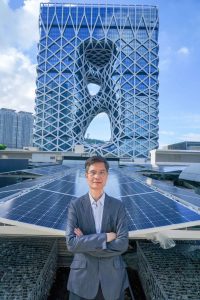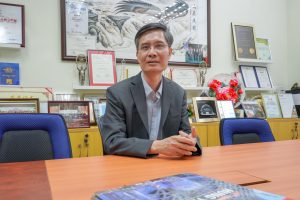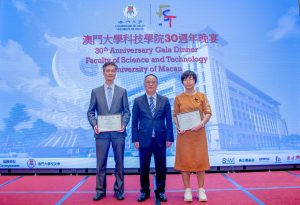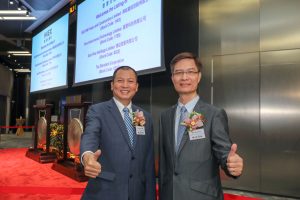If a designer is someone who designs your dream home, then an engineer is the person who turns that dream blueprint into an actual house.
Sou Kun Tou, an alumnus of the University of Macau (UM), is such a ‘dream builder’.After graduating from UM in 2002 with a master’s degree in electromechanical engineering, Sou worked in the private and public sectors, in both engineering and management positions. He is currently the council president of the Macao Institution of Electrical and Mechanical Engineers as well as the executive director and CEO of a construction company, which became listed in the Hong Kong Stock Exchange in 2018. Looking back, Sou says there are no shortcuts to success; it all hinges on whether one can seize the opportunities that arise.
Choosing to Stay in Macao
After graduating from Huaqiao University in 1988 with a bachelor’s degree in precision mechanical engineering, Sou became an assistant engineer at Macao Water. At the time, in an effort to train bilingual language professionals, the Macao government launched a series of programmes to sponsor qualified applicants from Macao to study in Portugal. Sou applied to the programme and was selected. However, after much consideration, he decided to stay in Macao to gain more practical work experience.
In 1997, UM launched a master’s degree programme in electromechanical engineering in an effort to cope with the demand for a new type of professionals. Sou immediately enrolled in the programme, hoping to upgrade his knowledge so that he could become a registered electromechanical engineer some day. But he soon encountered a huge challenge. ‘The rest of the students were all much younger than me. Most of them were fresh graduates from college, so studying theories was a breeze for them,’he explains. ‘I was the only working student in the class, so it was very difficult to juggle a full-time job and the academic commitments.’ So how did he overcome that challenge? He says, ‘I had to bite the bullet and get used to it. ’
So far, several programmes offered by the Faculty of Science and Technology (FST) have received full accreditation from the Hong Kong Institution of Engineers (HKIE). These include the Bachelor of Science in Electromechanical Engineering, Bachelor of Science in Civil Engineering, Bachelor of Science in Electrical and Computer Engineering, and Bachelor of Science in Computer Science. Students starting these programmes from the 2011/2012 academic year onwards are eligible to apply for HKIE membership upon graduation to receive professional qualifications that are recognised worldwide. Sou says because English is the main medium of instruction at UM, his English improved greatly during his postgraduate study at UM. ‘After graduation from UM, I was able to confidently negotiate business deals with foreigners in English. Apart from professional knowledge, I think English proficiency is the biggest gain from my postgraduate studies at UM,’ he says.
Currently an external member of the Advisory Committee of the Department of Electromechanical Engineering, Sou meets regularly with faculty members from the department to discuss the planning of the academic programmes. He points out that faculty members in the department always keep their finger on the pulse of the changing society to ensure that the programmes meet the needs of the market. For this reason, graduates from the department are always in great demand.
Don’t Let Any Opportunity Pass You By
Before Macao’s handover to China, the construction industry in Macao was sluggish. In 1994, with six yearsof experience at Macao Water and private companies under his belt, Sou decided to join the Leal Senado (the Municipal Council of Macao), the predecessor of the current Institute for Municipal Affairs (IAM). It was only after the liberalisation of the Macao casino monopoly following the city’s return to China, and the subsequent construction of various large-scale integrated resorts, that the demand for professionals in the construction industry took off. Having accumulated experience in both the government and the private sector, Sou decided it was the right time to start his own business. So in 2006, he left his government job as the head of the equipment section of the IAM and founded a company with his partner.
Initially, the company focused on electromechanical engineering projects, but what really established its reputation in the industry was a structural steel project. One day, a friend asked Sou if he was interested in undertaking a structural steel project for an integrated resort. At the time, his company did not have as much experience in structural steel projects as it did in electromechanical engineering projects, and the deadline set by the client was very tight. However, Sou was hesitant to let the opportunity slip by, so he said yes without knowing whether he could pull it off. Fortunately, his team managed to complete the project on time, earning his company several more projects from the satisfied client. ‘If I could offer a piece of advice to anyone who hopes to start his own business some day, I would say this: Don’t set limits on yourself. Don’t just do things that you like or are good at, because that way you shut the door on a lot of opportunities,’ says Sou. His company is now involved in many large-scale projects in Macao, and what he is most proud of is the steel structure his company built for the world’s first free-form exoskeleton high-rise.
There Are Always Untapped Niches
Pointing at a just-renovated lift, Sou says, ‘There is a high degree of continuity in electromechanical engineering, in the sense that the completion of each project only marks the beginning of a long process of maintenance and repair, which involves a lot of manpower and resources. So there are always untapped niches in this industry.’
For students who wish to pursue a career in electromechanical engineering, he offers these words of advice: ‘You must be able to deal with different expectations from different parties. For instance, Party A may want you to finish the project on schedule, but Party B asks you to pay attention to safety. Then Party C requests you to keep the cost down. It’s a lot of pressure, and a rookie may not be able to handle such pressure.’ As an employer, Sou believes attitude trumps everything, saying that a main predictor of a person’s potential to become successful in this industry is the ability and willingness to learn and do things beyond his or her duty.
Earlier this year, Sou received the Outstanding Alumni Award from the FST, in recognition of his outstanding achievements in the electromechanical engineering industry. He is grateful to his alma mater UM for the education provided by the institution. He attributes his success to his willingness to work hard without caring about short-term gains. Maybe it sounds clichéd, but it indeed reflects the personal philosophy by which Sou lives his life.Source: My UM ISSUE 93

UM alumnus and engineer Sou Kun Tou, who is the executive director and CEO of a publicly list construction company

Sou Kun Tou says that UM’s Department of Electromechanical Engineering offers academic programmes that answer the needs of the industry

Sou Kun Tou (left) and Yang Yan (right) receive the Outstanding Alumni Award from UM Rector Yonghua Song

Sou Kun Tou and his partner Robby Kwok at Hong Kong Stock Exchange on the day their company became listed
